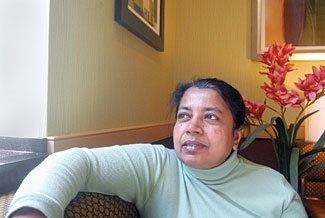 |
KANDY, SRI LANKA - The photo of the young man in uniform sits on a corner of a glass-fronted cabinet, facing the front door. Second Lt. Achin Tcha hasn't been home since he went missing in action Sept. 27, 1998, during a fierce battle with Tamil Tiger rebels.
Visaka Dharmadasa hasn't given up hope that her son will walk through the door again. His remains, and those of over 600 other servicemen missing from the battle, were never recovered, though many unidentified bodies were later found burned in a mass grave. For the families of the fallen, uncertainty over the fate of their loved ones compounds the sorrow.
Without a body or a proper burial, grieving is stalled and paralysis sets in, says Ms. Dharmadasa, who runs Parents for Servicemen Missing in Action, a nonprofit group that she founded in 1998. In a landmark case, it successfully sued Sri Lanka's military over its failure to use DNA testing to trace missing soldiers.
But as Sri Lanka hails a hard-fought victory over the Liberation Tigers of Tamil Eelam (LTTE) after 26 years of civil war, Dharmadasa worries that more families are facing the same agony.
"Over and over again, we have told [the government] don't cremate the bodies. And right now, God knows what's happening," she says.
Sri Lanka's military has said 6,261 soldiers died and nearly 30,000 were injured during a three-year offensive. More than 22,000 LTTE fighters died over the same period.
The military insists that all fallen soldiers are now recovered and that families are afforded proper funerals, another issue for which Dharmadasa's organization has campaigned. But she says the military still hasn't carried out DNA tests on unidentified bodies fallen in battle, despite the court ruling.
In 1999, she persuaded the International Committee of the Red Cross to directly assist some 3,000 families in tracing missing relatives. She also lobbied for all soldiers to be issued dog tags and for all those killed, including rebels, to be photographed.
Dharmadasa's campaign has made her a workaholic, she admits. Most evenings find her taking calls and answering e-mails at her home office in Kandy, the former royal capital in Sri Lanka's central highlands. In 2006 InterAction, a US-based coalition of aid groups, recognized the value of her work by naming her its Humanitarian of the Year.
On a recent morning, over cups of milky tea, she explains how she used to help with her husband's business. He is her second husband; she divorced the first for adultery when she was 22 and was left with two sons. She remarried and give birth to a third son.
She brushes a stray hair from her eyes, and her voice trembles. "These two [elder] children are not only my sons. They're my brothers. They're my friends. They kept me going. When I was crying because of my former husband, my eldest son would wipe my tears and say, 'I'm here for you.' "
In her work, Dharmadasa has also reached out to Tamils (she belongs to the majority Sinhalese Buddhists, who make up about three-quarters of Sri Lanka's 20 million people). In 1999, she began traveling to LTTE strongholds to meet bereaved mothers. Some spat back at her in anger. Others took her in with sympathy. In 2000, she founded the Association of War Affected Women to bridge the ethnic divide.
Her journey has put her firmly in Sri Lanka's peace camp. She argues that her advocacy doesn't stop her honoring the troops and their sacrifices. Indeed, her eldest son, Dananjaya, is a major in the Army and inspired Lieutenant Achin Tcha, her second son, to enlist.
"If there's no war, people won't go missing in action. The best way to [end war] is to join with women on the other side of the divide," she says.
Back in 1998, Dharmadasa's mind raced in another direction. She began fantasizing about killing Velupillai Prabhakaran, the ruthless LTTE leader who pioneered the use of suicide bombers with vests packed with explosives. Maybe, she reasoned, I could do the same to him, and that might stop a hateful war.
"I thought, 'I'll go and finish it, once and for all, so everyone will be happy. I'll finish it.' But then I understood very properly and clearly. Prabhakaran is just one person. Unless we find solutions to the problems of the Tamil people, they'll be more Prabhakarans," she says. (In May, Mr. Prabhakaran was killed by Sri Lankan military forces.)
Those solutions include education programs and helping women from both sides of the divide to run for public office. Only 6 percent of seats in Parliament are filled by women. But any lasting peace must be based on power sharing with the Tamil-dominated north, she says.
During the cease-fire, Dharmadasa met with several LTTE officials. In December 2003, a group of rebels came to her home. When they saw the photo of Achin Tcha, they told her that he was in LTTE-held territory.
That revelation, and snippets of information from exiled Tamils, convinced her that the group may be holding her son and other captured soldiers as prisoners of war.
After Achin Tcha went missing, her youngest son, Venu, vowed to join up and avenge his brother. Dharmadasa talked him out of it. Later she and her husband took Venu to Kilinochchi in northern Sri Lanka to meet with LTTE leaders, talk to Tamils, and try to see their viewpoint.
It was another leap of faith for a woman who speaks of tolerance and understanding in a country that often seems to be bereft of both. "None of these people took [Achin Tcha] as a target because they were angry with my son," she says. "If his gun was quicker, it could have been someone else who was dead."
Page created on 8/5/2009 12:00:00 AM
Last edited 1/5/2017 8:59:00 PM
